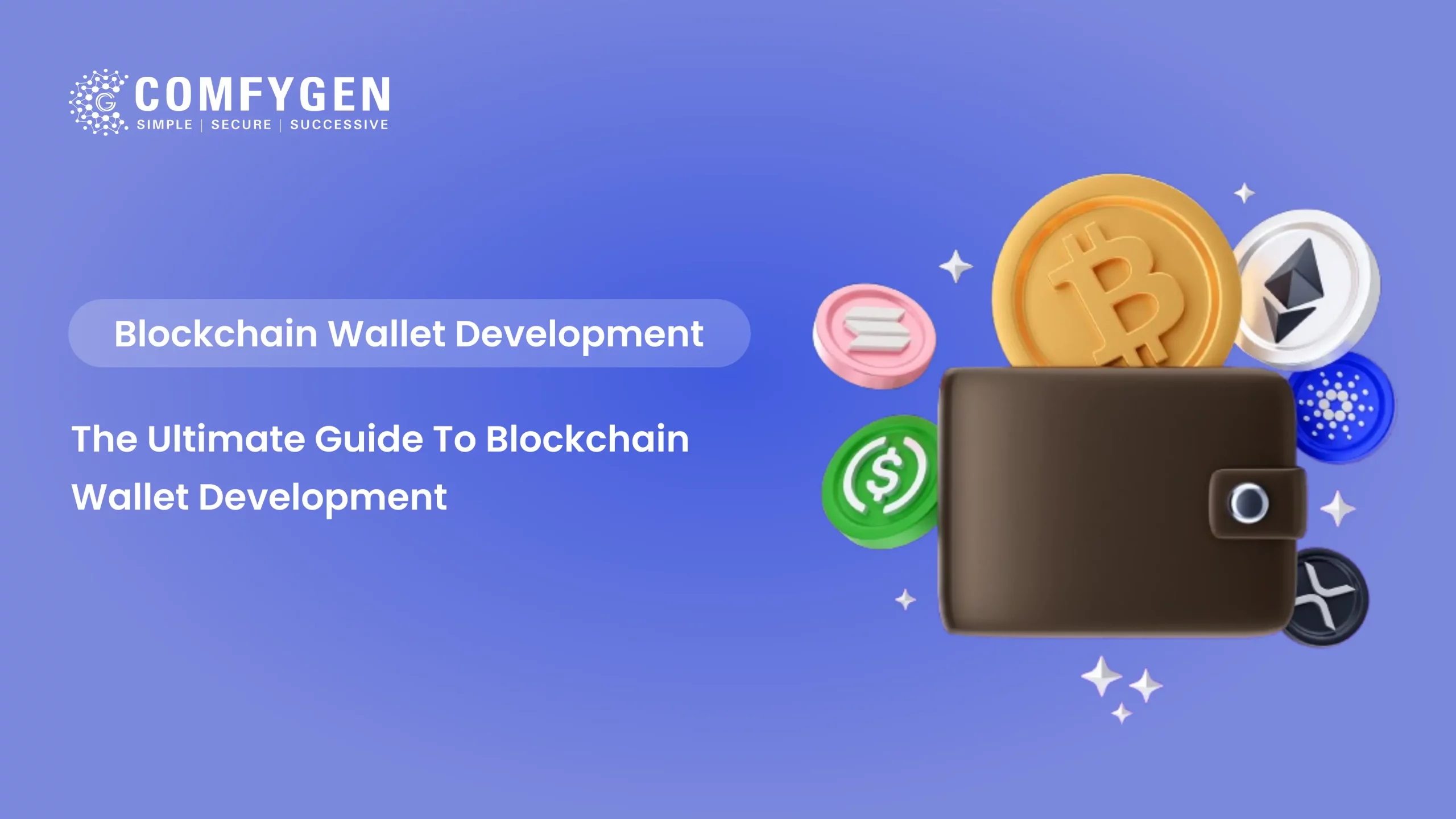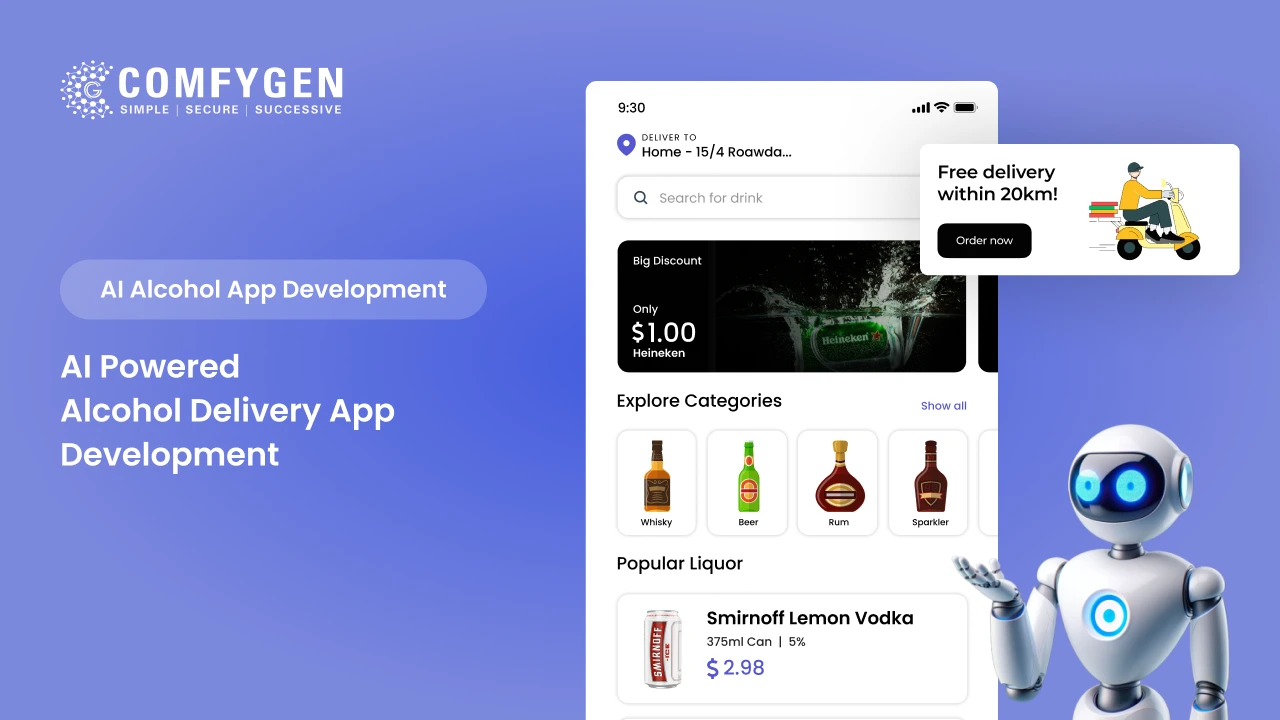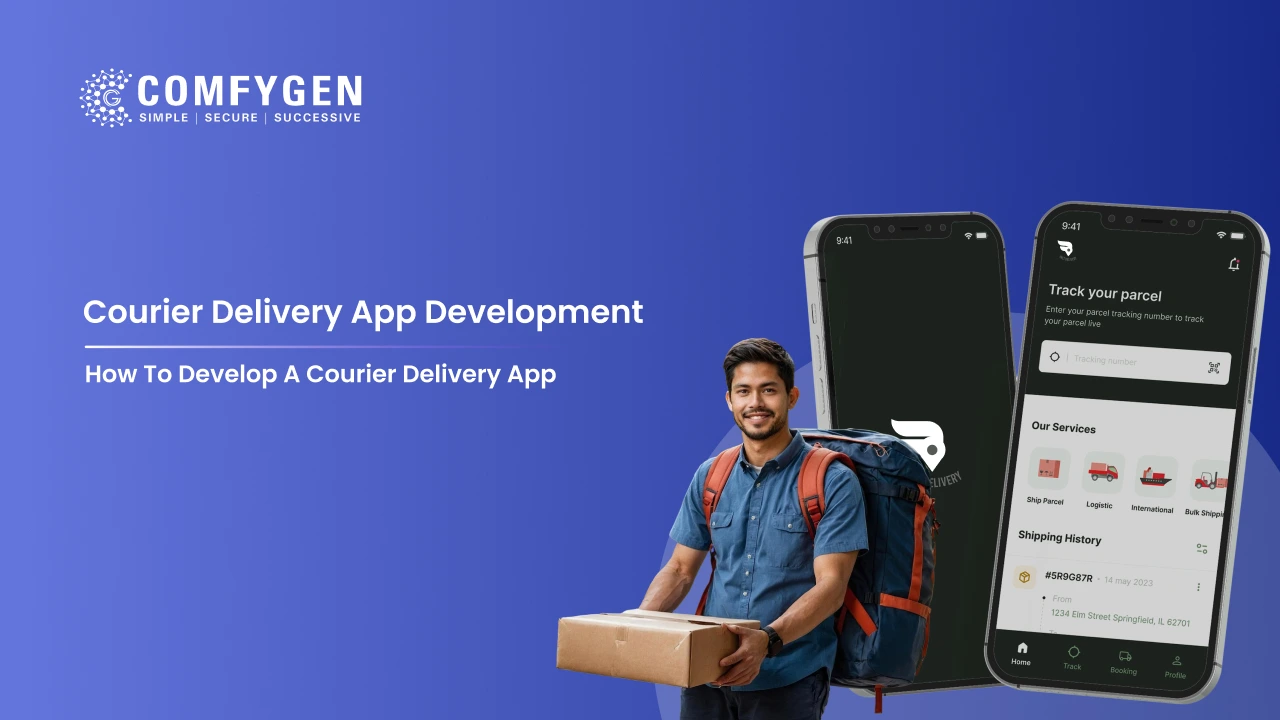Think of it this way: the private key is like the PIN or security code you use to withdraw money from your bank account. The public key is similar to your bank account number, which you can safely share with others so they can send you funds.
Blockchain technology is changing the way we save, transfer, and invest money. Blockchain wallets are at the center of this change, providing safe digital tools for managing cryptocurrencies without the need for banks or intermediaries. As interest in digital assets grows, Blockchain wallet development is becoming essential for businesses and individuals who want secure, user-friendly solutions.
In this blog, you will learn how blockchain wallets function, the types available, why they are important, and how to create your wallet from scratch. Whether you’re a developer, entrepreneur, or cryptocurrency enthusiast, this guide will help you understand the entire ecosystem.
What Is a Blockchain Wallet?
A blockchain wallet is a software application (or hardware device) that generates, stores, and manages public and private keys, allowing you to send, receive, and track digital currency balances.
Unlike traditional wallets, which retain physical cash, blockchain wallets do not store your money. Instead, they give tools for securely interacting with the blockchain, which is where balances are stored.
Key Components:
- Private Key: A secret cryptographic key used to approve transactions and prove ownership. It acts like your digital signature and is used to approve transactions and prove ownership of your cryptocurrency. Whoever holds the private key controls the funds—so it must always be kept secure and never shared.
- Public key : Generated from your private key and used to make wallet addresses. While it’s linked to your private key, it can safely be shared. It’s used to verify digital signatures and is also the basis for creating your wallet address.
- Wallet address: This is a hashed version of your public key that you share with others when they want to send cryptocurrency to your wallet. It’s safe to distribute publicly, as it doesn’t reveal your private or public keys.
Difference from Traditional Digital Wallets:
-
No central authority controls your wallet.
-
Transactions are irreversible and transparent on the blockchain.
-
You alone are responsible for managing your private keys.
How Do Blockchain Wallets Work?
Blockchain wallets rely on cryptographic key pairs to manage funds. When you create a wallet, it generates unique keys that prove ownership and enable you to securely send, receive, and track digital assets on the blockchain.
Sending Crypto: You specify the recipient’s wallet address and the amount, and then your private key creates a digital signature that’s broadcast to the blockchain network.
Receiving Crypto: Others send funds to your wallet address, and the network verifies the transaction before updating your balance on the ledger.
Transaction Recording: Miners or validators confirm your transaction, making it a permanent part of a block on the blockchain.
Mechanisms That Make a Crypto Wallet Work
Crypto wallets use advanced cryptographic mechanisms to securely store keys, sign transactions, and interact with blockchain networks. These systems ensure your digital assets remain safe and accessible anytime. In the sections below, we’ll explore exactly how these mechanisms work step by step.
1. Key Pair Generation – When you create a wallet, it automatically generates a private key (secret passcode) and a public key (a mathematically generated private key). The private key stays hidden in your wallet, while the public key can be safely shared.
2. Wallet Address Creation
The public key is run through a cryptographic hash function to create your wallet address, which people use to send you cryptocurrency.
3. Transaction Signing
When you want to send money, your wallet uses the private key to make a digital signature. This signature confirms that you have the funds and authorizes the transaction without sharing your private key.
4. Broadcasting to the Network
The signed transaction is broadcast to the blockchain network, where nodes verify its authenticity by checking the digital signature against your public key.
5. Transaction Verification and Recording
Miners (Proof of Work) or validators (Proof of Stake) verify the transaction’s validity and place it in the new block. Once added to the blockchain, the transaction is permanently recorded and cannot be changed.
6. Balance Updates
After confirmation, your wallet updates to reflect the new balance by scanning the blockchain for transactions linked to your addresses.
These combined procedures provide the security, transparency, and full ownership of your digital assets without depending on a central authority.
Why You Should Consider a Cryptocurrency Wallet
If you’re exploring the world of digital currencies like Bitcoin or Ethereum, having a secure and reliable way to store them is a must—and that’s exactly what a cryptocurrency wallet offers. These wallets act like your personal digital vault, giving you full ownership and control of your crypto assets without needing a bank or third party. As a crypto enthusiast, keeping your digital funds safe, organized, and accessible is essential. Whether you’re an investor, trader, or business, there are many reasons to consider your own blockchain wallet development—especially with the help of a trusted enterprise blockchain wallet development company. From enhanced security to greater independence, a crypto wallet puts the power of finance directly in your hands.
1. True Ownership of Your Assets
When you store crypto on an exchange, you don’t actually hold the keys to your funds. A cryptocurrency wallet gives you complete ownership and control, so no third party can freeze or take your assets. This means your money is truly yours, without relying on any centralized company to access it.
2. Strong Security
Crypto wallets use advanced encryption and private keys to protect your funds. Hardware wallets even keep your keys offline, making it nearly impossible for hackers to steal your coins. With extra layers of security, you dramatically reduce the risk of losing your investments to cyberattacks or fraud.
3. Instant, Global Transactions
With a wallet, you can send and receive cryptocurrency anytime, anywhere in the world. There’s no waiting for banks or paying excessive fees to intermediaries. This is perfect for freelancers, remote workers, and businesses who need fast cross-border payments.
4. Privacy and Confidentiality
Using your own wallet means you don’t have to share personal details with exchanges or other platforms. You control how much information you reveal when making transactions. This added privacy helps protect your identity and keeps your financial activities discreet.
5. Multi-Currency Convenience
Many wallets can store dozens (or hundreds) of different tokens in one place, helping you manage your entire crypto portfolio more easily. You don’t need separate apps or accounts to track everything—just one secure wallet for all your coins.
6. Access to Decentralized Apps
Modern wallets do more than hold coins—they also let you interact with decentralized apps (dApps), stake tokens, trade NFTs, and use smart contracts, all from a single interface. This means you can explore the growing world of DeFi and Web3 tools without needing a separate platform.
7. Ideal for Long-Term Investing
If you plan to hold crypto as an investment, a secure wallet is the safest way to store your assets for months or years without relying on an exchange’s security. You can “HODL” your tokens confidently, knowing your investments are protected even during market volatility.
8. Financial Freedom
A wallet lets you control your finances independently, free from banks or governments. For many people, this is one of the most powerful benefits of blockchain wallet development . Whether you value autonomy or want a backup plan against inflation, a wallet gives you true economic empowerment.
Types of Cryptocurrency Wallets
Choosing the right type of blockchai wallet is essential for cryptocurrency security, ease of use, and control over your funds. Below are the main categories:
Custodial vs. Non-Custodial Wallets
Custodial Wallet – A wallet where a third-party company manages and stores your private keys on your behalf. This setup is very beginner-friendly because you don’t have to worry about securing your keys yourself. If you forget your password or lose access to your account, the platform can help you recover it easily. The main advantage is convenience and built-in customer support. However, the downside is that you don’t truly control your crypto—your funds rely on the security and policies of the service provider. If the exchange is hacked or freezes your account, your assets could be at risk.
Examples of Custodial Wallets: Coinbase Wallet (hosted), Binance Wallet, Kraken Wallet
Non-Custodial Wallets – This puts you in complete control of your private keys and funds. No third party can access, freeze, or manage your assets. This approach offers more privacy and true ownership, making it ideal for long-term holders and experienced users. However, it also means you are fully responsible for keeping your recovery phrase and private keys safe. If you lose them, there is no way to recover your wallet or restore your crypto.
Examples of Non-Custodial Wallets: MetaMask, Trust Wallet, Ledger Nano S (hardware), Trezor
Hot vs. Cold Wallets
Hot Wallets – Hot wallets are cryptocurrency wallets that stay connected to the internet, which makes them very convenient for frequent transactions and everyday use. You can access your funds quickly through mobile apps, desktop applications, or web-based wallets. This ease of access is why many traders and active users prefer hot wallets for sending and receiving crypto anytime. However, because they are always online, hot wallets have a higher risk of hacking or malware attacks.
Examples of Hot Wallets: MetaMask (browser extension and mobile app), Trust Wallet, Coinbase Wallet (mobile app)
Cold Wallets – Cold wallets store your cryptocurrency completely offline, providing maximum security against online threats and hackers. These wallets are best suited for long-term storage and safeguarding large amounts of crypto. Since they are not connected to the internet, they are much harder to compromise. The most common cold wallets include hardware devices like Ledger and Trezor or even paper wallets that store keys on paper. The main risk is physical—if you lose or damage the device or your backup, you can permanently lose access to your funds.
Examples of Cold Wallets: Ledger Nano S / Ledger Nano X, Trezor Model T, Paper Wallets
Mobile, Desktop, and Web Wallets
Mobile Wallets – A mobile crypto wallet is an app you install right on your smartphone, making it easy to access and manage your coins anytime. This type of crypto wallet app is perfect for scanning QR codes, making fast payments, or checking your balance while on the move. Just remember, if your phone gets hacked or stolen, your funds can be at risk, so always enable strong security features like PIN codes and biometric locks.
Desktop Wallets – A desktop Bitcoin wallet is software you install on your computer, giving you more security and control compared to web-based solutions. Many traders prefer a secure desktop crypto wallet because it keeps their private keys stored locally rather than on a server. While desktop wallets are safer than browser wallets, they can still be exposed to malware, so it’s essential to keep your operating system and antivirus software up to date.
Multi-Signature Wallets – multi-signature crypto wallet is designed to require approvals from multiple private keys before any transaction can be processed. This setup is perfect for shared accounts or business use, where you don’t want any single person to have total control. As a secure Bitcoin wallet for teams, it provides extra protection against unauthorized transfers and theft.
Hierarchical Deterministic (HD) Wallets – HD wallet crypto solution automatically generates a fresh address every time you send or receive coins, improving your privacy by avoiding address reuse. Thanks to a single recovery phrase, a hierarchical deterministic wallet backup lets you easily restore all your funds and transaction history if you ever lose access to your wallet. Most popular wallets today, like Ledger and Trust Wallet, follow this standard to keep backups simple and secure.
Future Trends in Blockchain Wallet Development
Blockchain wallets are evolving fast to meet the demands of a more connected, decentralized world. Here are some of the biggest trends you’ll see shaping the next generation of wallets:
-
Integration with DeFi and Web3
Next-gen wallets will act as a gateway to decentralized finance apps, NFT marketplaces, staking platforms, and other Web3 services, so you can lend, borrow, trade, and invest without leaving your wallet.
-
NFT Support
With NFTs becoming more popular, modern wallets are adding built-in NFT galleries. This means you’ll be able to store, view, and manage your collectibles and digital art alongside your coins in one place.
-
Cross-Chain Compatibility
Future wallets will make it simple to manage assets across several blockchains—including Bitcoin, Ethereum, Solana, and others—all from a single app. No more switching between wallets to access your tokens.
-
Decentralized Identity
Blockchain wallets will increasingly include decentralized identity (DID) functions. This means you’ll be able to privately verify your identity without depending on centralized services, unlocking new use cases such as secure logins and digital reputation.
-
Enhanced Security with Biometric and Multi-Factor Authentication
Expect more wallets to adopt biometrics (fingerprint and facial recognition) combined with multi-factor authentication to keep your funds safe from unauthorized access.
-
Social Recovery Options
To solve the problem of lost keys, wallets will offer social recovery, letting you assign trusted contacts to help you restore access if you ever lose your credentials.
-
AI and Automation
Artificial intelligence will help automate tasks like transaction categorization, tax reporting, and fraud detection, while smart alerts will notify you of suspicious activity.
-
Improved User Experience and Education
Future wallets will heavily focus on intuitive design, simplify onboarding, and include built-in learning resources that help beginners get started confidently.
-
Integration with Traditional Finance
More wallets will let you connect your crypto to fiat on-ramps, payment cards, and bank accounts, making it simple to spend or convert your assets when needed.
Why Choose Comfygen Technologies for Your Blockchain Wallet Development?
If you’re looking for a trusted partner to build a secure and feature-rich blockchain wallet, Comfygen Technologies stands out as a leading crypto wallet development company. Here’s why businesses around the world choose us:
1. Proven Expertise in Blockchain Development
With years of experience delivering high-quality blockchain development, our developers understand the nuances of wallet architecture, cryptographic security, and multi-currency integrations.
2. Custom Wallet Solutions
Whether you need a mobile crypto wallet, a desktop application, or an enterprise-grade multi-signature wallet, we design and build solutions tailored to your business goals.
3. End-to-End Security
We implement the latest cryptographic standards, including multi-signature authorization, hierarchical deterministic (HD) wallets, and biometric authentication, ensuring your users’ assets remain fully protected.
4. User-Friendly Design
Our team focuses on intuitive, modern interfaces that make sending, receiving, and managing digital assets easy, even for non-technical users.
5. Full Compliance and Best Practices
From KYC/AML integration to regulatory compliance and audit trails, we ensure your wallet platform meets all relevant legal and industry standards.
6. Ongoing Support and Maintenance
Comfygen Technologies offers dedicated support, updates, and maintenance to keep your wallet running smoothly as blockchain ecosystems evolve.
Conclusion
Blockchain wallets are the core of the cryptocurrency ecosystem, providing users with secure and personal control over their digital assets. Whether you are planning to safely store currency, create your wallet app, or explore the world of DeFi and NFTs, a solid understanding of how wallets function is necessary. Remember, never disclose your private keys or seed phrase, always choose the correct form of wallet for your needs, and if you’re developing one, consider security and usability from the start.
Ready to Build Your Blockchain Wallet?
Get in touch with Comfygen Technologies today to discuss your project and discover how we can bring your vision to life with secure, scalable, and innovative wallet solutions.

Mr. Saddam Husen, (CTO)
Mr. Saddam Husen, CTO at Comfygen, is a renowned Blockchain expert and IT consultant with extensive experience in blockchain development, crypto wallets, DeFi, ICOs, and smart contracts. Passionate about digital transformation, he helps businesses harness blockchain technology’s potential, driving innovation and enhancing IT infrastructure for global success.









